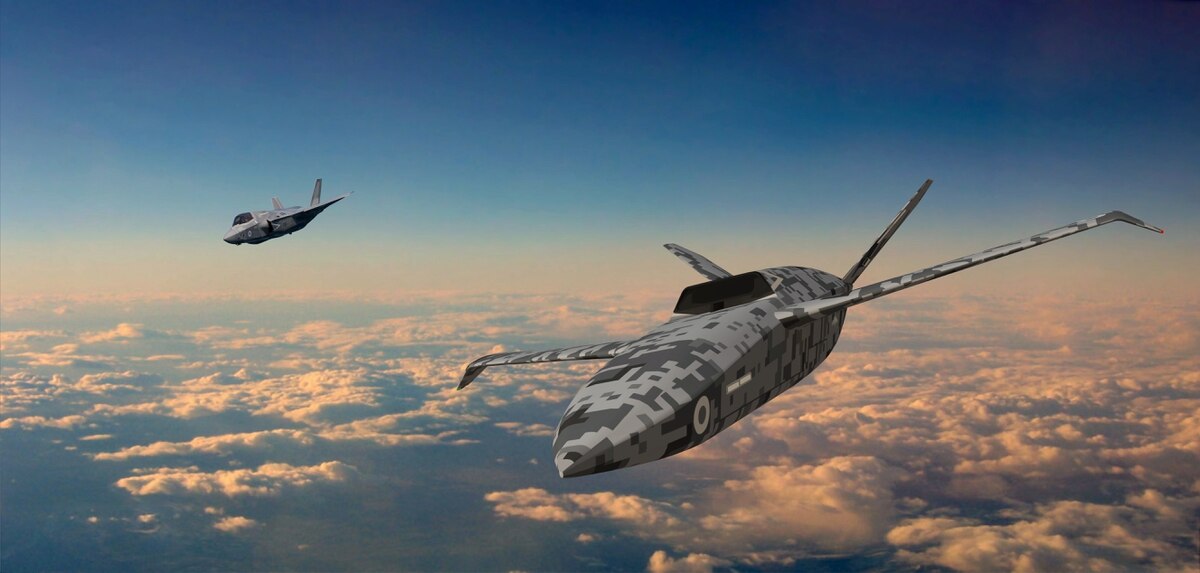Britain prepares to get air combat drones to fly alongside fighter jets, following a 30 million pounds ($41 million) contract to design and manufacture a prototype in the next three years.
Project details:
The unmanned aerial vehicle (UAV) known as “Loyal Wingman” will fly alongside Typhoons and F-35s to shoot down enemy aircraft.
The British government signed a contract with the Belfast unit of Spirit AeroSystems, the US-based group which last year acquired the former Bombardier business in Northern Ireland. The contract includes a full-scale vehicle flight test program by the end of 2023.
Russia’s next-generation ‘Centurion’ combat suit of the future
According to Royal Air Force, the unmanned combat aircraft will be designed to fly at high-speed alongside fighter jets. The ‘Loyal Wingman’ armed with missiles, surveillance, and electronic warfare technology to provide a battle-winning advantage over enemy forces.
The program named “Team Mosquito” also includes the UK unit of Northrop Grumman if completed successfully then the fighting drones could be deployed alongside with Royal Air Force’s fighter jets by the end of the decade.
“If successful, project Mosquito’s findings could lead to the capability being deployed alongside RAF Typhoon and F-35 lightning jets by the end of the decade”. The UK’s Ministry of Defense said in a statement.
The three-year contract will generate more than 100 jobs in Belfast, the British government said.
“Last November, the country announced its biggest military spending increase since the Cold War, pledging to end the ‘era of retreat’. The extra 1.5 billion pounds of investment for military research and development will help fund the new drones”. According to Reuters.
Work maturing the Lightweight Affordable Novel Combat Aircraft (LANCA), will run for three years until the conclusion of the flight trials, UK’s Ministry of Defense official said.
China deployed Type 99A MBT in high altitude border
The drone is now a Royal Air Force Rapid Capabilities Office (RCO)-led project under the Future Combat Air System Technology Initiative (FCAS TI).
The project Mosquito of developing the ‘Loyal Wingman’ is one of the several future air combat initiatives being started by the British government, including the development of the Tempest next-generation manned and unmanned combat aircraft and drones swarm projects.
“This is a great win for the Northern Ireland defense industry and will showcase some of the most pioneering engineering work currently being undertaken in the UK”, Defense Minister Jeremy Quin said. “The 30 million ponds project will accelerate the development of the UK’s future air power by delivering the cutting-edge uncrewed aircraft, maintaining our position as a world leader in emerging technologies.”
The Ministry of Defense further said, by using the latest software development techniques and civilian aerospace engineering and manufacturing expertise, the project will deliver dramatic reductions in costs and development timelines, so their innovations can reach the front-line quicker than ever before.
“We are taking a revolutionary approach, looking at a game-changing mix of swarming drones and crewed fighter aircraft like Mosquito, alongside piloted fighters like Tempest, that will transform the combat battlespace in a way not seen since the advent of the jet age.” UK’s Chief of the Air Staff said in a statement.
“Project Mosquito is a vital element of our approach to Future Combat Air, rapidly bringing to life design, build, and test skills for next-generation combat air capabilities. Autonomous ‘loyal wingman’ aircraft creates the opportunity to expand, diversify, and rapidly upgrade Combat Air Forces in a cost-effective way now and in the future”, Director of Future Combat Air Richard Berthon.
Analysis:
As the UK’s defense officials said, it is a great step forward and helps the government to lead the world in the field of modern air combats.
It is a timely decision made by the British government to start the ‘loyal wingman’ the Mosquito project. It helps Britain to step into the future air wars with the involvement of a minimum number of soldiers.
Sources:
- Article published in Reuters news
- Article published in the Defense News
- Article published in UK Defense Journal
- Article published in The Times
- Information provided by UK Government’s official website


